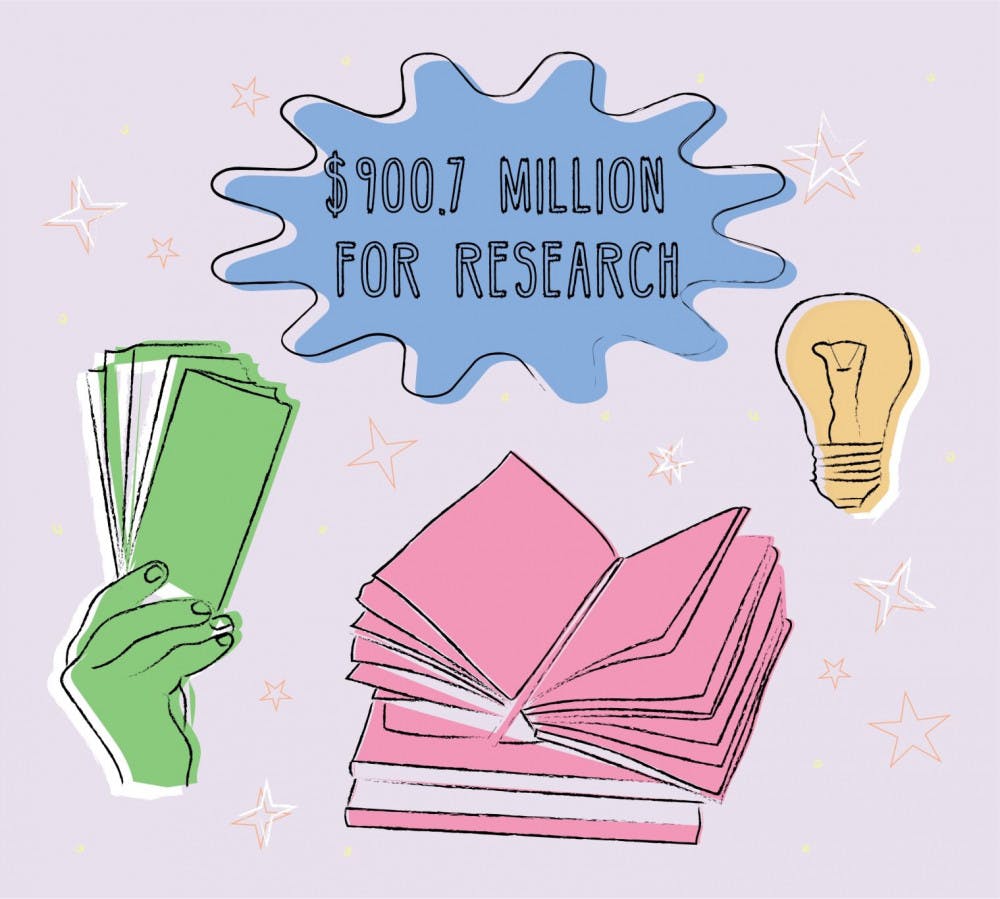
During an otherwise challenging time, UF managed to earn a record $900.7 million in research funding in the 2020 fiscal year.
When the COVID-19 pandemic hit in March, UF Research worried rewards would fall off, said Joseph Kays, director of communications for UF Research. However, faculty submitted 5,688 research proposals, 559 more than in 2019, which contributed to the record-breaking number, he added.
Kays said the federal government is the university’s biggest funding source because universities do a large portion of the basic research in the U.S., which especially applies to fields like physics, chemistry and astronomy.
This year, a record amount came from federal research awards, more than two thirds of the total, Kays said.
The remaining awards came from private foundations and non-profits such as the Bill and Melinda Gates Foundation and the Juvenile Diabetes Research Foundation; companies like Boeing, Microsoft and L3 Harris that support applied research projects related to their own fields; state and local governments; and from “other,” which can include gifts for research, internal funding and other small categories, Kays said.
“Other” included about $15 million from UF internal funding, mostly from UF Direct Support Organizations like the UF Foundation and the UF Research Foundation, Kays added.
Kays said UF also received a $25 million gift for Artificial Intelligence (AI) research from Chris Malachowsky, UF alumnus and co-founder of NVIDIA, a multinational technology company, which will include the most powerful AI computer at any university in the U.S. UF students will be able to connect to the technology to interpret large amounts of data and detect patterns and irregularities.
The National Science Foundation responded to the pandemic by providing Rapid Response Research (RAPID) awards to encourage coronavirus-related research.
Dr. Tara Sabo-Attwood, chair of the UF Department of Environmental and Global Health, received the $104,000 RAPID grant she submitted a proposal for within a week of her application in early May.
Her research focuses on using nanotechnology to capture and inactivate COVID-19 particles on personal protective equipment.
Dr. Sabo-Attwood said that with the grant, they are not only working on how to effectively kill the virus on personal protective equipment, but also on how to make masks comfortable and convenient for people to wear.
Kays confirmed that $61.3 million awards came from the U.S. Department of Defense. This year’s Department of Defense funding included $1.375 million to study amyotrophic lateral sclerosis (ALS), $1.67 million to study genetic markers for heat stroke and more than $1 million to study how environmental change impacts human migration, Kays said.
The Defense Advanced Research Projects Agency, under the Department of Defense, awarded $7.8 million to the Florida Institute for Cybersecurity (FICS) Research at UF to allow security features to be incorporated into computer chips, Kays said.
Mark Tehranipoor, director of this research division, said the $7.8 million award is spread over four years, but that it is just one of the many fundings the FICS received this last fiscal year. He was responsible for $30 to $40 million of research awards, he added.
With the $7.8 million award, Tehranipoor and his team are working on developing inexpensive countermeasures and security mechanisms that can be automatically inserted into any microchip in the future, Tehranipoor said.
“The fact that research funding is going up means more resources for the university, more cutting-edge research that can be carried out, and more reputation in the fields,” Tehranipoor said.

Aurora Martínez is a journalism senior and the digital managing editor for The Alligator. When life gives her a break, she loves doing jigsaw puzzles, reading Modern Love stories and spending quality time with friends.





